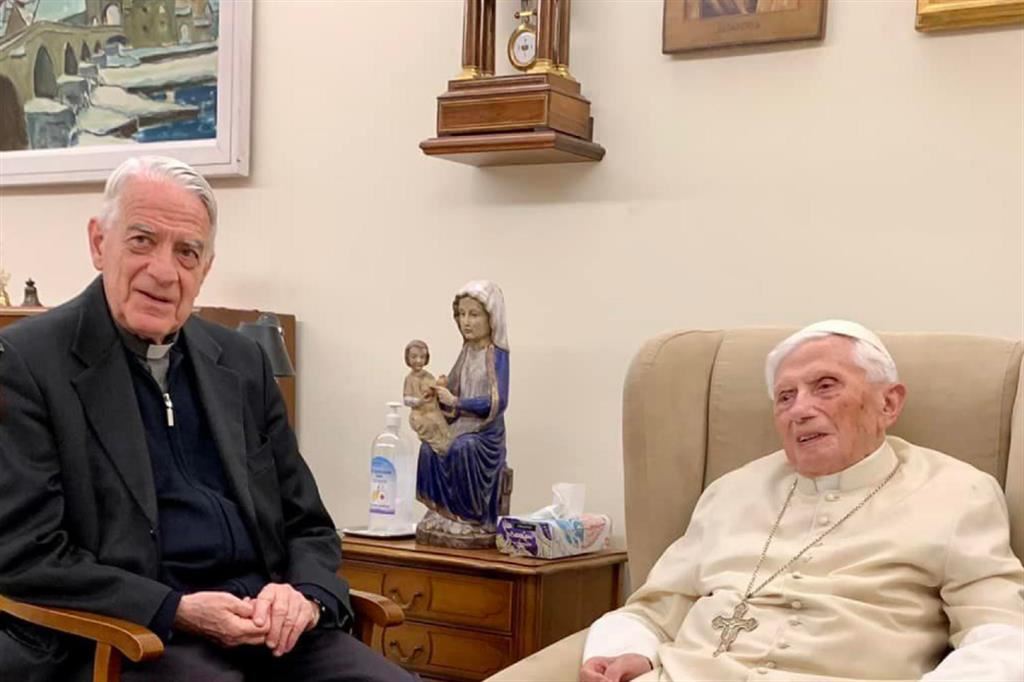The Pope thanks Benedict XVI. with father Lombardi – Ansa
The almost ten years of Benedict XVI. as Pope Emeritus were providential. Because they have allowed us to better focus on the person of Joseph Ratzinger and his pontificate. He also laid the foundations for continuing to develop his legacy “as he would have wished”, that is, with a view to the future and not just in the exegesis of his thinking and teaching. The circumstances of his death then gave us the picture of an absolute fidelity to the mystery of Christ, carried to the end, as the last words show. Father Federico Lombardi, during the years of his pontificate director of the Vatican Press Office and now president of the Ratzinger Benedict XVI Foundation, read the events of the last few days yesterday on the eve of the funeral that Francis will celebrate this morning in St. Peter’s Square. Emphasizing the spiritual depth with which Pope Ratzinger prepared himself for an encounter with God.
Father Lombardi, let’s start again from the beginning. Did what happened help us better understand who Benedict XVI was?
I think so. He had been preparing to meet the Lord for at least ten years. And he told us very clearly when he said goodbye to us at the end of his pontificate: to withdraw to the mountain in prayer, especially in the inner confrontation with Jesus, everyone who has followed this time knows that. In the “Last Conversations” with Seewald, too, he had said very touching words about the climate of spiritual preparation that he experienced. I was particularly touched by the words in which he mentioned standing before Jesus Christ and contemplating his words in the Gospel, and those that remained particularly great and mysterious to him. The figure of Christ, long studied by him, was his compass to the end, especially in worship, one of the cornerstones of his pontificate and also a fundamental reference point for understanding his personality.
After all, his last words (“Lord, I love you”) also point in this direction.
And not just them. I think of the letter he wrote after the allegations from Germany last year. There was an explicit reference to the encounter with the Lord and the attitude with which he was preparing. Humility and awareness of his own sins and those of the Church on the one hand, but great trust in the Judge and also in the Advocate, the Paraclete who loves you and tells you “do not fear” and who accompanies you as you cross the threshold of death , which approaches the mystery.
You have seen him many times over the past ten years. How was the pope emeritus up close?
My encounters were mainly (but not exclusively) those in which I accompanied the Ratzinger Prize winners. They were moments of meeting people of theological and spiritual depth that he valued and who valued him very much. Very interesting meetings, both for the cultural and theological issues covered and for the relationships formed. But what struck me most was his intact intellectual curiosity. He was interested in the subjects the laureates worked on and asked very pertinent questions, often reminiscing about situations decades ago. I was amazed at the mental and spiritual presence and memory with which he conducted the interviews. Of course, in the last two sessions, the voice had weakened a bit, so much so that Monsignor Gänswein’s help had to be resorted to at times. But the presence and clarity were always the same.
In the speech of Pope Francis at the awarding of the Ratzinger Prize 2022 reference is made to his gaze.
In fact, the shine of the eyes was really impressive. The Pope had pointed out the contemplative eyes with which Benedict looked at us. And that’s an observation I’ve made over the years. Not only did he tell you about the intelligence, the wit and the attention with which he approached all his interlocutors, often accompanied by a very sweet smile. He gave you the impression that he went deep and searched for you and your soul. It was a look that expressed an extraordinary amount of depth, foresight and spirituality. An aspect that really stood out in the close relationship.
Are you saying that the ten years were like a magnifying glass to see Benedict XVI. to understand better?
Seems like a good picture to me. I remain convinced that some time lag has had a positive impact on a more balanced vision of the pontificate. In recent years there have also been some moments of discussion about some of his interventions, but they seem so microscopic to me that it really made no sense to interpret them in terms of tension with Francesco. Absolutely unfounded thing. Instead, one must view one’s time as emeritus as one continuous series of prayers. And also on the part of the people, the great influx of these days shows how deep the affection has remained, perhaps the reflection on the great importance of his pontificate, especially on the instructive depth of the direction of the church in difficult times, emerges even more clearly. And renunciation is also better understood in this broader context.
You are President of the Ratzinger Foundation. How can the legacy of Benedict XVI. be preserved and passed on?
I think it is extremely important not just to do an exegesis of his thought and keep it in closed memory. But continue to look, as he did, to the great questions of the Church and culture in today’s world, to engage in a dialogue between faith and reason, to seek the foundations of care for creation and genuine human rights in a world prone to it tends to multiply them only to realize they conflict with each other. So look ahead. Also to adopt his vision of the continuity of the “subject church” in history and in the succession of the pontificates.


